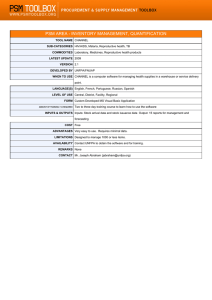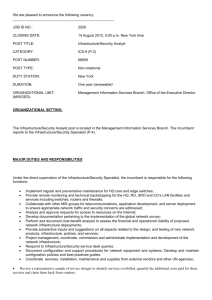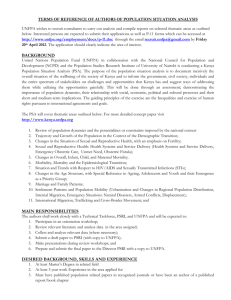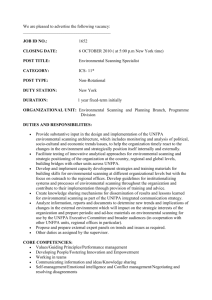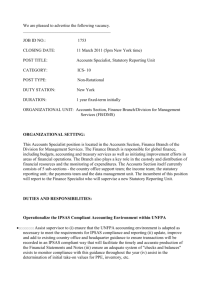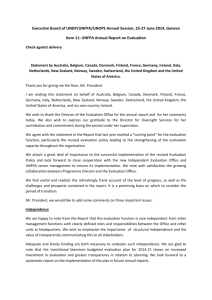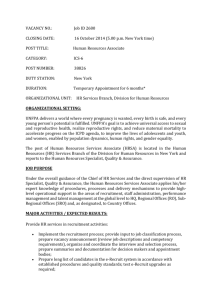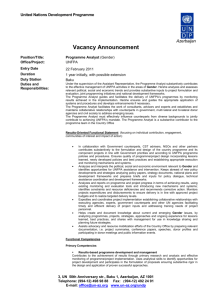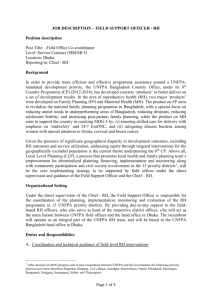Concept Note
advertisement
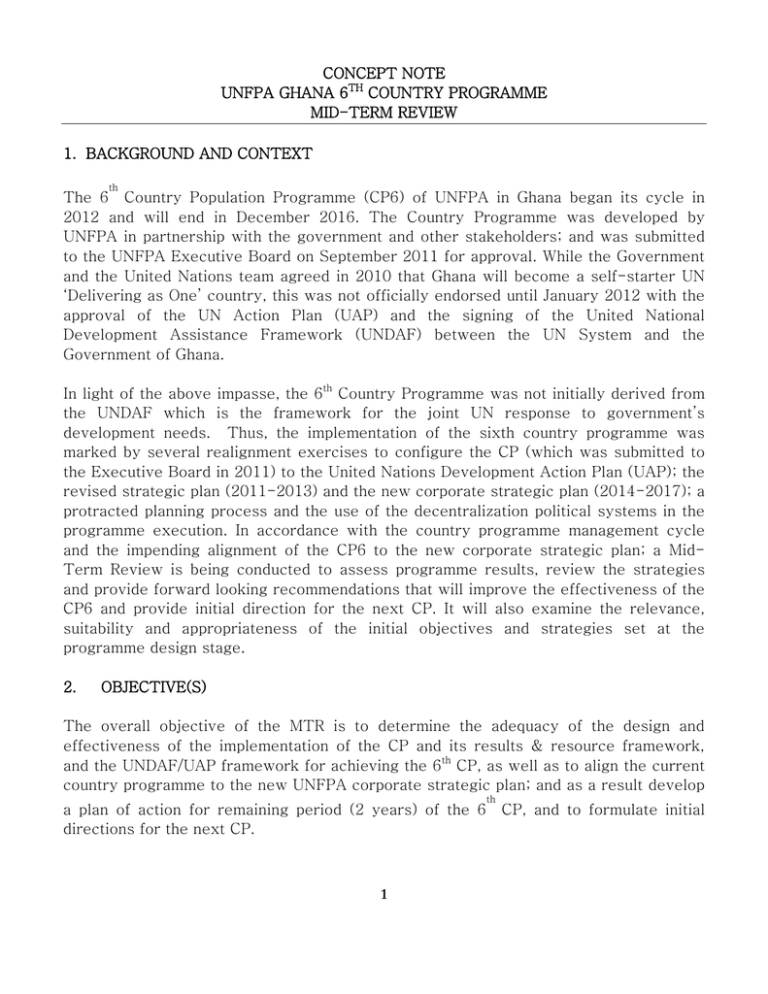
CONCEPT NOTE UNFPA GHANA 6TH COUNTRY PROGRAMME MID-TERM REVIEW 1. BACKGROUND AND CONTEXT th The 6 Country Population Programme (CP6) of UNFPA in Ghana began its cycle in 2012 and will end in December 2016. The Country Programme was developed by UNFPA in partnership with the government and other stakeholders; and was submitted to the UNFPA Executive Board on September 2011 for approval. While the Government and the United Nations team agreed in 2010 that Ghana will become a self-starter UN ‘Delivering as One’ country, this was not officially endorsed until January 2012 with the approval of the UN Action Plan (UAP) and the signing of the United National Development Assistance Framework (UNDAF) between the UN System and the Government of Ghana. In light of the above impasse, the 6th Country Programme was not initially derived from the UNDAF which is the framework for the joint UN response to government’s development needs. Thus, the implementation of the sixth country programme was marked by several realignment exercises to configure the CP (which was submitted to the Executive Board in 2011) to the United Nations Development Action Plan (UAP); the revised strategic plan (2011-2013) and the new corporate strategic plan (2014-2017); a protracted planning process and the use of the decentralization political systems in the programme execution. In accordance with the country programme management cycle and the impending alignment of the CP6 to the new corporate strategic plan; a MidTerm Review is being conducted to assess programme results, review the strategies and provide forward looking recommendations that will improve the effectiveness of the CP6 and provide initial direction for the next CP. It will also examine the relevance, suitability and appropriateness of the initial objectives and strategies set at the programme design stage. 2. OBJECTIVE(S) The overall objective of the MTR is to determine the adequacy of the design and effectiveness of the implementation of the CP and its results & resource framework, and the UNDAF/UAP framework for achieving the 6th CP, as well as to align the current country programme to the new UNFPA corporate strategic plan; and as a result develop a plan of action for remaining period (2 years) of the 6 directions for the next CP. 1 th CP, and to formulate initial Specific objectives: Review the performance of the 6th Country Programme by demonstrating the results achieved from 2012 – 2014. • Overall performance of the 6th Country Programme in terms of progress against its targets; • The relevance / validity of the design of the 6th Country Programme to the national context, current policy environment and UNFPA corporate strategy; • Efficiency in the use of resources allocated for the implementation of the Country programme; • Draw conclusions and recommendations to improve the 6th Country Programme’s performance. 3. SCOPE The review will address a number of dimensions of the CP and the UAP and its implementation. The CP and the UAP has been guided since inception by a set of objectives focused on, inter alia, “achieving universal access to sexual and reproductive health, promoting reproductive rights, reducing maternal mortality, and accelerating progress on the ICPD agenda and MDG5 (a & b). The programme also support policy dialogue and advocacy on MDG5 to improve the lives of women and young people (including adolescents) and adopt a gender and rights-based approach to programming at national and subnational levels. The review should seek to determine the progress made against these objectives over the past two years as a basis for informing the country programme and strategic plan alignment and the strategies moving forward. In particular, the mid-term review will seek to determine: (i) How far Ghana has progressed against the objectives, indicators and associated targets identified in the UAP documents (ii) The primary factors and conditions that have been contributed to these results (iii) The extent to which the objectives and indicators has been designed and utilized as a basis for performance monitoring, with lessons identified and internalized to improve performance 2 The focus of the review should be forward looking and focused on developing consensus around the future priorities for the delivery of the UAP UNFPA results. The MTR will draw upon existing documentation to the extent possible and will ensure that the analysis and conclusions reached on the UAP UNFPA results are linked to relevant government processes and key policies to include the GSGDA and other national policies and plan. It is expected that the MTR will answer these key questions: Effectiveness: meeting the intended objectives on the right target groups; achievement of results - To what extent were the objectives of the UAP achieved/are likely to be achieved - What are the major factors influencing the achievement or non-achievement of the UAP objectives? - Will the strategies selected for the program lead to achieving its objectives and targets? Efficiency: justification of resource use (resource vs cost) - Were activities in the UAP/AWPs cost-efficient? - To what extent were programme inputs (funds, expertise, time, etc.) converted into results? - What was the timeliness of inputs (personnel, consultants, travel, training, equipment and miscellaneous costs) and of outputs? - Was the programme or project implemented in the most efficient way compared to its alternatives by the IPs? Relevance: is continued expenditure justified? - To what extent are the objectives of the programme still valid in light of the global priorities, current national priorities, UNFPA priorities and strategy, expectations of beneficiaries? - To what extent is the Country Programme and UAP aligned to the UNFPA corporate mandate? - To what extent are there pre-existing or potential development partners for whom there is complementarity with UNFPA’s interventions? - To what extent was the country office able to respond to changes in the national priorities and development context? Sustainability: results sustained after withdrawal of external support - To what extent did the programme help to establish building blocks/factors for future sustainability of the programme (e.g. favourable policy environment, infrastructure, earmarked government funding, etc.) - What were the major factors that influenced the achievement or nonachievement or sustainability of the programme? - Can the Government of Ghana and other stakeholders continue implementing current interventions without UNFPA support? 3 4. METHODOLOGY The review team (consultants) will among others conduct the following tasks: Desk Review of Basic documentation The consultant(s) will start with a desk review based on a minimum of documents (see annex 1), undertake a thorough review and analysis of the said documents, and: • • • • • Make reference to the country programme priorities, CPD (2012-2016) and UAP (2012-2016) to propose and share the methodology and tools of assessing the extent to which UNFPA has achieved its objectives, indicators and associated targets identified in the UAP, and how the UAP outputs, contributed to UAP outcomes and the new corporate strategic plan, as well asthe primary factors and conditions that have contributed to the UNDAF results. Review and analyse UNFPA’s quarterly and annual program progress reports, field monitoring reports, Ghana Country Office Annual Reports for 2011-2013; and UNDAF thematic and annual reports for the same years to articulate progress in program implementation. Synthesise available information to reflect on programme achievements particularly in advocacy and policy, capacity building, knowledge management and service delivery, as well as proposed programmatic and indicator revisions taking into account the revised 2011-2013 UAP and CP M&E framework as relevant. Assess the continued relevance of the programme strategies in view of the country situation and the new corporate strategic plan. Assess programme performance (efficiency, effectiveness and timeliness) and potential sustainability, identifying strengths and weaknesses. Consultation with Partners: • Consult with strategic partners including Government, UN agencies, and CSOs at the national and sub-national levels as part of the data collection process. • Use various government-led analysis and partner agency programme reviews to validate information on UNFPA’s performance. Field Work: • Undertake field visits to selected UNFPA focal regions/districts to access subnational based information and to engage with key actors at this level. Based on the data collected from monitoring activities, implementation of IPs activities and mission reports, analyze and assess the progress made in achieving the results of the Country Programme at all levels, if appropriate, but especially at the output and purpose levels. Use the UNDAF Results and Resource Framework and the corporate strategic plan, as the basis for analysis and assessment. Analysis of Budget and Resource: 4 • • • Review the availability and use of resources against budgets. Assess the efficiency as well as effectiveness in utilization of resources and assess future resource requirements to achieve the intended programme results. Asses the future resource requirements to achieve the intended programme results. Analysis of Management Arrangements: • Review management issues such as execution modalities, arrangements for implementing the programme and components, national capacity, technical backstopping, monitoring and evaluation, coordination and communication. 5. MANAGEMENT ARRANGEMENTS FOR CP MTR PROCESS: • • • • • • • At UNFPA Country office, under the overall guidance of the Representative and supervision of the Deputy Representative. The M&E Programme Analysts will act as UNFPA CP MTR focal point and will be responsible for a) coordinating b) securing technical assistance, c) organizing the review meetings and field visits d) coordinating and providing feedback and guidance to consultants. The MTR focal point will work very closely with other Programme Analysts. The consultants will periodically brief UNFPA programme team and Government lead agencies on their approach, progress and findings. The consultants will engage with the established Country Programme coordination and oversight mechanisms, such as National Steering Committee and National Technical Sub-committee; and the UN Inter-agency groups, such as the Inter-agency Programme Group - IPG and UN Monitoring and Evaluation group) for consultations and sharing information. In addition to the individual meetings with government, the consultants will engage with key stakeholders including donors, NGOs and research institutions. UNFPA CO will consult with WCARO and UNFPA Headquarters Programme Division for feedback and quality assurance of the processes and products. Input from the UNFPA MTR will be used to contribute to the UNDAF thematic review and subsequently UNDAF MTR. The consultants will make a presentation on the findings at the UNFPA MTR meeting. 6. COMPOSITION OF THE TEAM: • The team will be composed of two experts; with a mix of one international and one national consultants. There will be a team leader having at least ten years of professional experience in UNFPA mandate, evaluation methodology, strong analytical skills and expertise formulating development programmes in lower middle income countries, particularly in Africa. 5 • One national consultant will be selected having the following skill mix: familiarity with Ghana’s decentralized context, familiarity with UNFPA programme in Ghana, at least ten years professional expertise in Maternal Health, Reproductive Health, Population and Development and knowledge of evaluation methodology. The team leader will work with the national consultant to define the terms of engagement, deliverables and timeframe applicable to each consultant. 7. DELIVERABLES • An Inception Paper (with a draft work plan) after confirmation of acceptance to undertake the assignment and signing of a service contract, outlining methodology and approaches. • The team leader in consultation with the MTR focal point will develop terms of reference for each of the national consultants indicating specific deliverables and timeframe. • Prepare a draft report on the basis of documents reviewed, consultations, interviews, field visits and the discussions and following the report outline that is provided • Facilitate a meeting with key stakeholders and present the key findings of the midterm review to UNFPA and the government • Finalize the MTR report and synthesise the recommendations for the improvement of the current Country Programme and produce a final report of the review. The team leader will consolidate the whole report and present findings at the MTR meeting with the UNFPA country office team. 8. BIBLIOGRAPHY AND RESOURCES Initial list of documents and websites to be consulted by the assessment team: • Concept Note for the Mid-Term Review • The International Conference on Population and Development (ICPD) Programme of Action. • The CCA report on which the UNDAF is based. • The Country Programme Document (CPD 2012 – 2016, which fully maps out UNFPA’s interventions in Ghana • Action Plan of the United Nations Development Assistance Framework (UNDAF) 2012-2016. • Summary of budget sheet of various IPs (FACE, AWP & Others). • The Annual Programme Review Reports and Standard Progress Reports. • The National Population Policy (1996), Ghana MDG 5 Accelerated Framework and Country Action Plan (2011), Ghana Health Policy (2007), National Strategic Plan for Adolescent Health and Development (2010), the National Youth Policy (2010), the Youth Action Matrix (2012-2016), National Health Insurance Scheme (2003), 6 • National Strategic Plan for HIV and AIDS (2011-2015), Ghana Shared Growth & Development Agenda (2010-2013) Campaign on Accelerated Reduction of Maternal Mortality (CARMMA) 2009 etc. Other relevant documents can be provided by the programme and other stakeholders as when necessary 7
